







Are you suffering from missing teeth that are making it difficult to complete day-to-day tasks like eating and speaking? Dental implants in Portland can not only improve your quality of life, but also offer benefits that no other traditional restoration can. Whether you’re looking to replace a single tooth or multiple teeth, implant-retained restorations can keep your oral health on track and prevent issues such as jawbone deterioration. Let us refresh your smile by scheduling a consultation today!
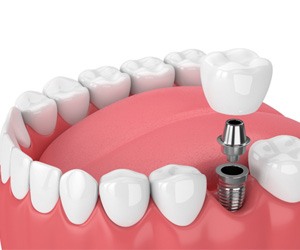
A dental Implant is a titanium implant post that is surgically placed into your jaw to act as a new root. An abutment is placed onto the post to connect a customized restoration that’s designed to match your natural teeth. You’ll enjoy a nearly perfect replica of your tooth using a solution that can last for a lifetime with the right aftercare, like brushing, flossing, and visiting your dentist at least twice a year.
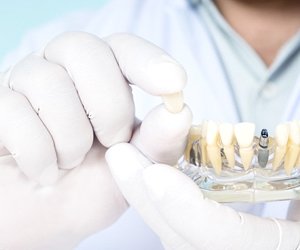
If you’re ready to enjoy the next best thing to your real teeth, dental implants in Portland may be the solution for you. They have the potential to last for a lifetime, allowing you to make a long-term investment in your oral health and your quality of life. You will need to be prepared to undergo a multi-phased treatment process that will include oral surgery. Don’t worry, Dr. McInnis takes the time to explain the process and what you can expect, so you can head into your placement surgery feeling confident.

No matter if you’re missing one, multiple, or all your natural teeth, you may be a candidate for dental implants if you have good oral and general health. You will need to schedule a consultation with your dentist in Portland, Dr. McInnis, to ensure they are right for you. She takes the time to discuss your dental and medical history while also learning more about your lifestyle to check for any risk factors that could compromise the success of your new smile.
In addition to a visual examination, she also takes a CT scan and digital images to have a complete picture of your oral health. Using the information that she’s gathered, you may need additional treatments before your placement surgery, like tooth extractions, bone grafting, or a sinus lift.
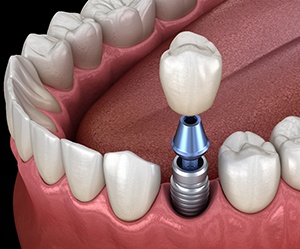
Your implant posts are surgically placed into pre-determined locations within your jawbone to serve as new tooth roots while also stabilizing your restoration. Your oral surgeon will use sedation or anesthesia to ensure your comfort during the procedure, so you don’t need to worry about feeling any pain.
Your gum tissue is carefully opened to expose your jawbone. A special dental tool drills small holes into your bone to allow the implant posts to be inserted. Your tissue is sutured closed, and you’ll spend the next several weeks healing.

The implant posts act as new roots, so they stimulate your jaw to promote new bone growth. Over the next few weeks, your bone will fuse to the posts. This process is called osseointegration, and it allows your implant posts to potentially remain in place forever.

As soon as we receive your custom-made restoration (i.e., crown, bridge, or denture), you’ll return to the office for its placement. We’ll carefully attach it, completing your smile. Once we polish it and make sure it’s to your liking, you will be able to put your new grin to use that very same day!

One reason that dental implants are recommended by patients and professionals alike is because they offer a variety of benefits that traditional restorations aren’t able to. Investing in the best option for your smile is a great choice because you’ll be able to reap all of the benefits they offer. Below, you’ll find a few examples!

Tooth loss can negatively impact your quality of life by making it difficult to chew and smile confidently. Fortunately, dental implants have the opposite effect! Roughly 500,000 patients choose this tooth-replacement solution each year because of:

Dental implants also have a positive impact on your oral and overall health. Here are a few examples:

Although dental implants require a higher investment upfront, they come with several long-term benefits. A few include:
If you’re interested in learning more about the benefits of dental implants – and why you should choose them over other tooth-replacement solutions – then schedule an appointment with us!

If you’re wondering whether or not you’d be a good candidate for dental implants, we can let you know. If you’re missing a single tooth or many teeth, dental implants can help. The best way to find out more is to schedule a consultation with Dr. McInnis.
To determine your eligibility for dental implant placement, you’ll first need to visit us at River Place Dental to undergo a thorough examination. One of the main areas Dr. McInnis will focus on is the amount and condition of your remaining jawbone. Because of the careful approach taken before any work is done, the dental implant process has a 95% success rate.
After the assessment is made, you’ll sit down with your dentist in Portland to discuss her findings as well as her final recommendation. You’ll also be able to ask any other questions you may have about the procedure.
For patients who are just missing a single tooth, at RiverPlace Dental, we can place a custom-crafted crown retained by an implant without impacting any of your surrounding teeth. With traditional bridges, in order for their success, they have to rely on altering your natural teeth’s enamel and being anchored to them, which could leave them vulnerable to oral health problems.
If patients are missing several teeth throughout their mouth, implants can still be the best solution. Implant-retained bridges and dentures can give you a stable and strong restoration where you won’t have to worry about jeopardizing your remaining natural teeth’s health.
Instead of getting dentures in Portland that can slip and shift in your mouth while you’re trying to eat and chew, implant-retained ones are the more comfortable and stable solution. You can enjoy a stronger bite due to the fact that they’re fused with your jawbone.

If you are hesitant or unsure about the investment you’re about to make in dental implants in Portland, Dr. McInnis and her team want you to feel confident about your decision. Not only are you choosing a superior treatment solution, but dental implants are the only tooth replacement method that can deliver undeniable stability and functionality. We know you have options, and we understand there are other solutions that can give you the look you want, but when it comes to investing in your smile and your oral health, there’s no better option than dental implants.
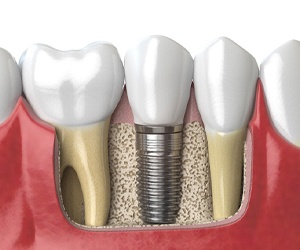
Dr. McInnis is proud to be able to provide her patients with a variety of dental implant options. Why? The reason is that you might have one, multiple, or all your teeth missing, and should any of these instances occur, it’s nice to have a stable solution that can meet all three dental needs.
The different types of implants include:
As one of the prime cost indicators of determining the cost of your dental implant placement, you can expect to pay significantly less if you are receiving a single tooth implant, in comparison to someone receiving an implant-retained denture. However, if you have several missing teeth throughout your mouth, the price will increase with each individual single tooth implant.

While the initial cost for dental implants is high, what makes them so great is that in the long run, you will most likely spend less on additional dental work. A traditional bridge or dentures need to be replaced every decade or so, but dental implants can last a lifetime with proper care and maintenance. Not only are they the longer-lasting solution, but they’re also:

Although most dental insurance companies do not cover the cost of dental implants, you may be able to have parts of the process covered, including your initial consultation, anesthesia, and pre-implant dental work.
At RiverPlace Dental, we offer a stress-free payment plan through CareCredit, which means the overall cost of your procedure can be broken down into monthly payments with little to no interest accrued.

Not everyone is an automatic candidate for implant treatment. If your jawbone has deteriorated over time, you may not have sufficient bone strength to support dental implants. But don’t worry! At RiverPlace Dental in Portland, we perform advanced dental implant procedures such as sinus lifts or bone grafts to fortify weakened jawbones and pave the way for successful smile restorations with implants. Keep on reading to learn more about these modern treatment options.
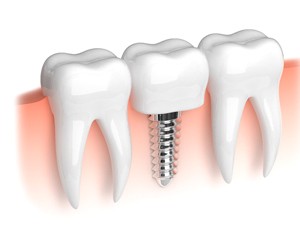
Bone grafting is a specialized procedure designed to stimulate healthy bone growth in the mouth and rebuild damaged or deteriorated bone.
The bone graft procedure involves placing grafting material – usually processed bone minerals – in specific areas of the jaw where the bone is weak or missing. The grafting material stimulates the body to create and deposit new bone cells in the area, gradually returning the jawbone back to full strength.
Grafting material may come from different sources, including the patient’s own hip or back of the jaw, a separate human donor, an animal source, or synthetic grafting material.
It typically takes between 3 to 6 months for the jawbone to fully integrate and heal following a bone graft in Portland. Once fully healed, you will be able to move forward with the dental implant treatment you need to restore your smile!
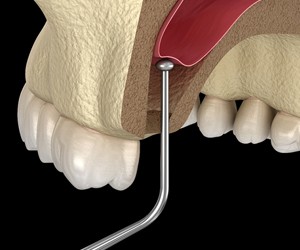
A sinus lift is a surgical procedure typically performed when a patient does not have enough bone to support a dental implant in the upper jaw near the molars and premolars. Bone must be added to the area, but the maxillary sinus is often in the way. A sinus lift, also known as sinus augmentation, makes room for the new bone by gently moving the sinus up and out of the way.
A sinus lift in Portland is typically completed in several steps:
You may experience some mild swelling and bleeding after the procedure, but any discomfort should quickly subside in just a few days.

Following dental implant placement, you’ll begin the recovery phase. We’ll guide you through what to expect, the symptoms to watch for, and the best ways to support your healing process. Our team will do our keep your journey smooth sailing. Read on for detailed post-op instructions for dental implants in Portland.

After getting dental implants, your main focus should be staying as comfortable as possible while ensuring the blood clot at the implant site remains intact. If the clot becomes dislodged, it can lead to a painful dry socket. To protect the clot, please avoid the following:

It’s normal to experience some mild side effects, especially in the first few days. Light, intermittent bleeding is common and can be controlled by gently applying gauze and pressure. This may last for several days but will improve over time.
Swelling is typical in the first 72 hours following surgery. Applying a cold or warm compress can help alleviate pain and reduce swelling. You may also experience mild pain or discomfort. Be sure to take your prescribed medication for relief. Rest assured – these side effects are temporary and should gradually subside. If they persist or worsen, please contact us for guidance and further treatment.

After dental implant surgery, chewing hard foods can risk dislodging your blood clot. To aid in your recovery, stick to a soft food diet for at least a few days. Consider stocking up on items like pudding, scrambled eggs, mashed potatoes, pasta, and cold soups.

You can continue brushing your teeth as usual the day after surgery but be gentle around the implant site(s). After meals, rinse your mouth with a saltwater solution at least 2 to 3 times a day. If prescribed, using a special mouth rinse can help accelerate healing. Avoid mouthwashes with alcohol, as they can dry out your mouth and hinder the recovery process.

Now that the procedure is complete, all that’s left to do is show off your brand-new grin. You might experience some mild sensitivity around your crown, bridge, or denture, but this is temporary and can be managed with pain medication. There’s no swelling, bleeding, or lengthy recovery, so you can return to your normal activities right away.

Your dental implants may allow you to enjoy a complete, healthy, and strong smile for a lifetime if you take excellent care of them. On the other hand, they will be much more prone to damage, infection, and early failure if you don’t take the proper precautions. Here’s a brief guide from Dr. McInnis to how you can employ a few habits such as regular dental visits to ensure that your implants last as long as possible.

While dental implants are impervious to cavities, practicing excellent oral hygiene is still crucial after receiving them since infections like gum disease can lead to their failure. One of the major benefits of dental implants is that they only require the same oral hygiene routine as real teeth, so make sure that you are sticking to a daily regimen of brushing at least twice, flossing at least once, and using antibacterial mouthwash.

Getting the right nutrition is a great way to help your implants form a strong bond with your gums and jawbones. Luckily, implants make it easy to enjoy the diverse, nutritious, and delicious diet the body needs to stay healthy by allowing patients to enjoy foods like savory steaks, crunchy nuts, and snappy raw fruits and veggies. Make sure you are getting plenty of protein, calcium, and vitamin C while taking care to avoid overindulging in hard, sticky, or sugary foods that can lead to infection or dental damage.

Certain bad habits can lead to infections or implant damage or failure. It’s best to kick any tobacco habits completely at least two weeks before receiving implants so the gums can heal thoroughly. Using your real or artificial teeth to open packages or bottles or to chew on inedible objects is a great way to injure them, so remember to use an appropriate tool or chew on sugar-free gum instead.

While dental implants are remarkably strong, they are not invincible and can break or become dislodged if they experience significant trauma. If you play sports, wear a mouthguard to cushion your teeth against damage, and be sure to wear a nightguard to bed if you grind your teeth in your sleep.

Regular dental exams and cleanings are essential to the health of your dental implants. The American Dental Association recommends seeing us at our Portland office at least every six months, but some implant patients may need to see us more frequently. These routine visits allow our team to monitor your oral health, make sure your implant is in good shape, and address any issues while they are still in their early stages.

The method you choose for replacing your missing teeth will have a significant impact on your future, so it’s understandable for you to desire more information before making a decision. As you read on, we’ve provided answers to five frequently asked questions about the dental implant process. Therefore, when you visit our Portland office for an initial consultation with Dr. McInnis, you’ll already be more familiar with the dental implant process and better prepared to revamp your oral health!
One of the advantages of receiving a dental implant is that the entire process, from the type of implant to the shade of the final restoration, is customized to meet your specific desires and needs. Dr. McInnis will also take into consideration the number of teeth you have missing, whether you’ll need any restorative care before undergoing implant insertion, and the condition of any remaining teeth.
All of these factors impact the cost of your treatment. Therefore, to get a spot-on estimate, contact one of our helpful staff members to schedule a visit.
A feature that separates a dental implant from any other form of tooth replacement is its attachment at the jawbone level. This provides a degree of stability, durability and functionality that is only matched by the original tooth root itself.
Another contributor to achieving a beautiful new smile is the selection of the perfect ceramic restoration to rest atop your implant. We’ll work with you to find the right shade, shape, and size to create the most symmetrical appearance possible. Thus, you’ll enjoy greater confidence, and you’re likely to notice yourself smiling more!
Before committing to the dental implant process, you want to know that it’s worth investing your time and resources in. A determining factor is the expected longevity. One of the greatest advantages of dental implant placement is the fixture can typically last from 30 years to a lifetime. This requires proper care, though.
So be sure to brush and floss as you normally would and to monitor your consumption of foods that are higher in sugar. It’s also important to visit Dr. McInnis semi-annually for preventive care. Therefore, if there are any developing issues, they can be tackled early.
Because not all dental insurance programs are the same, you’ll need to review the coverage guidelines of your plan. In general, though, the available benefits will usually only cover any restorative care that’s needed pre-surgery. Then, a portion may be allocated to cover the final restoration.
If you’re in need of a more cost-effective solution, we also accept CareCredit, which is a form of low-to-no-interest financing that allows you to receive the vital care you need with convenient repayment options.